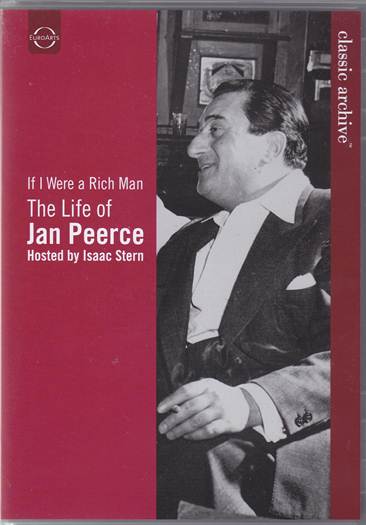
JAN PEERCE , the life of

www.euroarts.com
59 minutes in English
This DVD is a tribute to Jan Peerce and not a real documentary on his life. Host Isaac Stern talked with the tenor not long before he finished his career at 78 years of age and two years before he left us in 1984. Few people will agree with Peerce that the quality of a voice has no relationship with the age of the singer. He and a few others pretend the tenor is still as fine a singer as forty years ago but some snippets of music definitely prove the contrary. That is one of the frustrations one gets while watching this DVD. One sees Peerce in generous selections of Rigoletto and Eugene Onegin, recorded at the end of his career while once more visiting Israel. At the same time historical footage of Peerce in Inno delle Nazione and in a lot of shows during the early fifties are cut short though these show him to be in far better voice. Maybe even then this was not vintage Peerce anymore compared to the wonderful radio recordings he made before and during the war. Notwithstanding his forcefully insistence on his Jewish heritage Peerce was foremost an American singer. As a predecessor of Mario Lanza Peerce is far better in English language songs than in operatic fare. He tells us how much Toscanini insisted on “Parole, parole” but Peerce’s Italian pronunciation was pedestrian. He was not a very subtle singer and piano and mezza-voce were not his strong points. The elder he got the nasality of his voice became very pronounced and made us forget the excellent legato he displayed. Maybe the best part of this DVD are the cantorial songs he performed on television more than fifty years ago.
You don’t learn much on his life and career: just the basic facts which however are well illustrated with photo’s and footage. From this DVD you could wrongly conclude that for almost twenty-seven years he was an undisputed star of the Metropolitan. The truth is that his Met career took flight in 1941, due to the war which Americanized the opera house as Italian singers foremost didn’t appear anymore. When once more Italians and other Europeans arrived at the end of the forties his career at the New York house slowly petered out; especially when Bing became general manager as he was not a great admirer of the tenor. As could be expected there is no reference to his hated brother in law who arrived four years later at the Met and had a far bigger career in opera: Richard Tucker. His wife Alice once told Opera News that Peerce had ten priorities in life: one to five was to Jan Peerce, then came his son Larry, on place 7 it was once more Jan Peerce, Alice got place 8 and then there was room again for Jan Peerce. There is only one reference to his almost fanatical clinging to his faith: wherever he sang in the world he demanded kosher food, not an easy thing to procure in those days. But he also intended to pronounce the kaddish on his son Larry (thus proclaiming him to be death) when he didn’t marry a Jewish girl. He refrained from this action only when his wife threatened him with her suicide so that he would have a real reason to recite the kaddish prayer. You might deduce from this review I don’t like the tenor but this is not true. The rich colour of the younger tenor has a strong appeal and Peerce sang with gusto and had a way of phrasing with popular songs that made him rightly popular. But if you want to acquaint yourself with his art and his life it is far better to procure a video from his Firestone days, some of his best operatic and song recordings on Preiser Records or read his biography by Alan Levy.
Jan Neckers